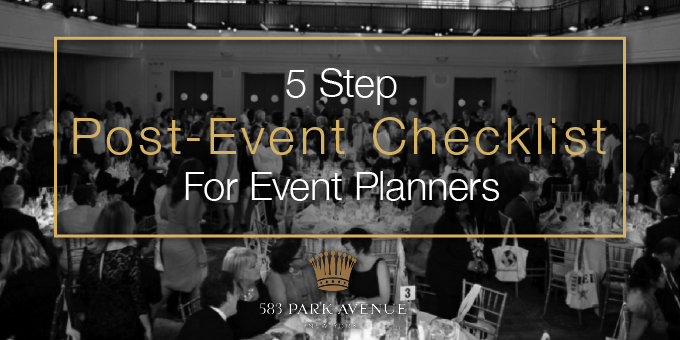
The party is over. Now what? While most events are just one night, what you do after the event can actually create substantial additional value for your client or organization. Conducting assessments, following up with key individuals, and syndicating event content can increase the event’s impact and create institutional learnings that influence future strategy. Below is our list of the five immediate post-event steps every planner should follow.
1. Personally Acknowledge Customers, Speakers, Staff, Guests and Donors
One of the best ways to ensure attendees remember the event and your organization fondly is to recognize them personally for their contribution, whatever it may be. For instance, consider giving speakers a special plaque commemorating the event, or provide top donors or clients with a handwritten note from your Executive Director or CEO. Go the extra mile for your volunteers as well, invite them next year as guests or send them a thank you gift. This individual recognition goes a long way in creating brand or cause advocates and extends the goodwill beyond just one night of fun.
2. Assemble and Syndicate Post Event Publicity Content
Organize the PR team to create a post-event publicity kit. Collect all images, videos and speeches from your event and compress them into a 3-4 page digital summary to send off to press outlets. Update your social media, website, and YouTube channel with event photos and videos. Be sure to tag or reference any key individuals or celebrities that attended the event. Post event press can have a significant impact on total ROI by drawing in less familiar supporters or targets to become connected to the organization or business.
3. Conduct Post Event Survey
Attendee feedback is the key to learning about the impact your event had on your target market. The insights you gain from an effective survey will help you develop more informed marketing messages for your future events and business operations. Create a survey with clear, quantitative questions and answer choices. Limit yourself to a maximum of 5 questions. Check out our guide for conducting an effective post event survey.
4. Conduct An ROI Evaluation
If you took the time to clearly define your event goals in the initial planning stage, you will be able to evaluate your event success now that it is over. However, sometimes ROI is difficult to quantify when your objectives lean towards a qualitative assessment. Associating quantitative values to qualitative goals will allow you to more effectively calculate your ROI in this situation. For example, if your goal is to build brand awareness, then one measure of success might be the number of social media mentions the event generated. It is important to predetermine a set of numbers to clarify what is considered successful. Note any ambiguity during this phase and plan on adding definition around it during the planning session for your next event.
5. Syndicate Event Content In Line With Business Goals
Did your event generate some compelling content? A great speech? An industry leading panel? Now is the time to take that content and leverage it to impact your business objectives. Maybe your CEO’s speech is appropriate to add to your press release? Or perhaps the panel of your clients or top donors would make sense on a key page on your website? Whatever the business application is, be sure to marry the best of your event with your business goals to increase the value of the content created at your event.
Are you planning a corporate event in New York City? Contact one of 583 PARK AVENUE’s Event Coordinators today to learn more about our venue.







